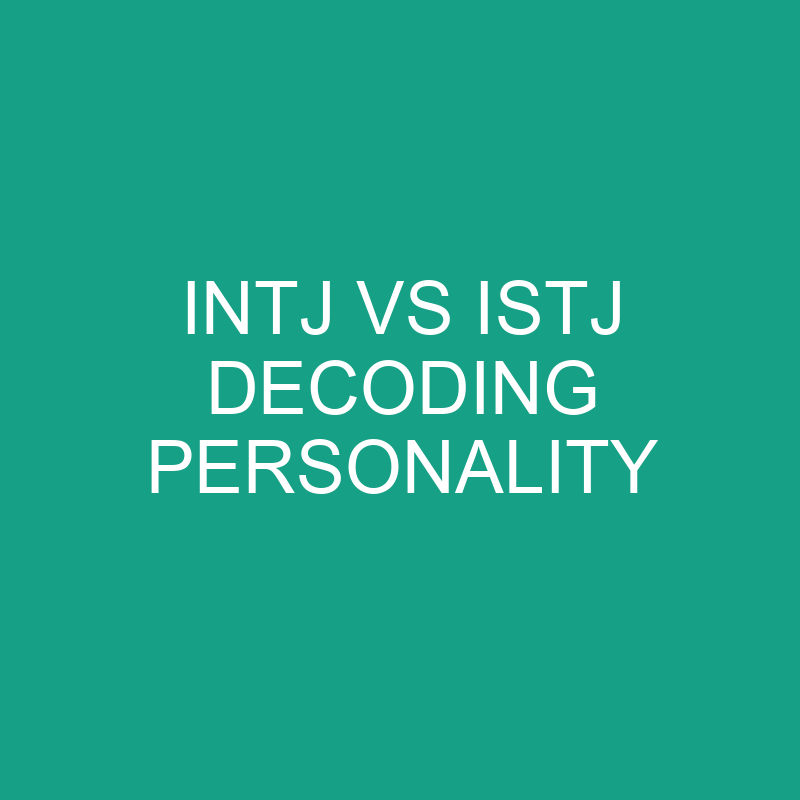In the vast landscape of personality types, the Myers-Briggs Type Indicator (MBTI) stands as a beacon, offering insights into the intricacies of human behavior. Two distinct personality types that often spark curiosity and comparison are INTJ (Introverted, Intuitive, Thinking, Judging) and ISTJ (Introverted, Sensing, Thinking, Judging). These types, while sharing certain traits, diverge in fundamental ways. Let’s embark on a journey of understanding these personality types, unraveling their traits, preferences, and the unique perspectives they bring to the tapestry of human interaction.
Post Contents
INTJ – The Architect
1. Overview:
INTJs are often referred to as “The Architects” of the personality types. They are strategic thinkers who excel in conceptualizing and executing complex plans. With a blend of analytical prowess and visionary thinking, INTJs are known for their ability to see the big picture.
2. Key Traits:
- Strategic: INTJs are natural strategists, capable of foreseeing long-term implications and developing comprehensive plans.
- Independent: They value autonomy and often prefer working independently, relying on their own insights and analysis.
- Visionary: INTJs are forward-thinking individuals who enjoy contemplating possibilities and envisioning future scenarios.
- Logical: Logic is a cornerstone of their decision-making process. They prioritize rationality and objective analysis.
3. Communication Style:
- Direct: INTJs are known for their direct and concise communication style. They value efficiency and clarity in conveying their ideas.
- Reserved: While they can express themselves eloquently, INTJs may come across as reserved or private, especially in more personal matters.
4. Work Environment:
- Leadership Roles: INTJs often thrive in leadership positions where they can implement their strategic visions.
- Problem-Solving: They excel in roles that involve problem-solving and require a high degree of analytical thinking.
ISTJ – The Inspector
1. Overview:
ISTJs are often dubbed as “The Inspectors” due to their meticulous and systematic approach to life. They are grounded individuals who value tradition and order. Reliability is a hallmark of their personality.
2. Key Traits:
- Detail-Oriented: ISTJs are meticulous, paying attention to details and ensuring that tasks are carried out with precision.
- Dutiful: They have a strong sense of duty and responsibility, often going to great lengths to fulfill their commitments.
- Organized: ISTJs thrive in structured environments. They prefer clear rules and procedures.
- Realistic: Pragmatism is a core aspect of their personality. ISTJs focus on what is practical and achievable.
3. Communication Style:
- Concrete: ISTJs communicate in a straightforward and concrete manner. They prefer tangible facts over abstract concepts.
- Reserved: Similar to INTJs, ISTJs can be reserved in expressing their emotions. They value professionalism and decorum.
4. Work Environment:
- Structured Roles: ISTJs excel in roles that require adherence to established procedures. They are often drawn to careers with clear hierarchies.
- Reliable Team Members: They are dependable team members who contribute to the stability of a work environment.
Comparative Analysis: INTJ vs. ISTJ
1. Focus of Attention:
- INTJ: Future-oriented, focusing on possibilities and strategic planning.
- ISTJ: Present-oriented, prioritizing practical, tangible tasks.
2. Decision-Making:
- INTJ: Decisions are based on long-term goals and a strategic vision.
- ISTJ: Decisions are grounded in facts and practical considerations.
3. Approach to Change:
- INTJ: Embraces change if it aligns with a long-term vision.
- ISTJ: Prefers stability and may be resistant to sudden changes.
4. Handling Details:
- INTJ: Sees the big picture and may overlook details.
- ISTJ: Meticulously attends to details and values precision.
5. Leadership Style:
- INTJ: Visionary and strategic, focusing on the overarching goals.
- ISTJ: Practical and organized, ensuring tasks are executed efficiently.
6. Adaptability:
- INTJ: Adapts well to change that aligns with their vision.
- ISTJ: Prefers routine and stability.
7. Handling Stress:
- INTJ: May withdraw and analyze when stressed.
- ISTJ: May become more focused on details and routine in stressful situations.
1. Friendships:
- INTJ: Values deep, meaningful connections. May have a small circle of close friends.
- ISTJ: Values longstanding friendships built on trust and reliability.
2. Romantic Relationships:
- INTJ: Seeks a partner who shares their long-term vision and values intellectual connection.
- ISTJ: Values a partner who is reliable, responsible, and shares their practical outlook.
3. Parenting Style:
- INTJ: Focused on guiding and intellectually stimulating their children.
- ISTJ: Emphasizes structure, discipline, and adherence to rules.
4. Conflict Resolution:
- INTJ: Prefers addressing conflicts through logical discussion.
- ISTJ: Values direct communication and practical solutions.
Conclusion: Embracing Diversity in Personality
While INTJ and ISTJ share the “Judging” and “Thinking” preferences, their differences in the realms of intuition, focus, and adaptability distinguish them in meaningful ways. Understanding these differences can pave the way for effective communication and collaboration, be it in the workplace, friendships, or romantic relationships.
The beauty of personality types lies in their diversity, contributing to the rich tapestry of human interactions. Whether you resonate more with the visionary intellect of an INTJ or the grounded reliability of an ISTJ, each personality type brings its unique strengths to the table. Embracing and appreciating these differences fosters a culture of understanding, allowing individuals to thrive in their authentic selves and contribute to a harmonious and dynamic social landscape.
